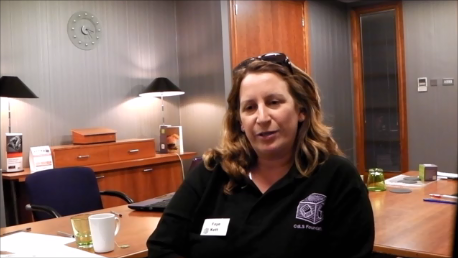Gastrointestinal Problems
Gastrointestinal problems are one of the most common health problems in Cornelia de Lange syndrome. Difficulties with the upper gastrointestinal tract, including the oesophagus, stomach and upper small intestine are common. The biggest of these problems is reflux.
What is the prevalence of gastro-oesophageal reflux in Cornelia de Lange syndrome?
Gastro-oesophageal reflux (GORD) (or as it is known in North America, Gastro-esophageal reflux disease (GERD)), is one of the most common medical conditions associated with Cornelia de Lange syndrome. The incidence of GORD is much higher than previously thought with the likelihood that around 8 out of 10 people with Cornelia de Lange syndrome could suffer from reflux.
What are the signs and symptoms of gastro-oesophageal reflux?
Signs of reflux may include vomiting, belching, heartburn, poor appetite or a change in behaviour including increased self-injurious or aggressive behaviour, abnormal positioning of the body, or irritability. Back arching can be in response to reflux pain.
Reflux can sometimes be ‘hidden’ if a person does not vomit or belch. Hidden or ‘Silent Reflux’ could be occurring if refluxing stomach acids rise into the oesophagus without heartburn or other symptoms. This can be dangerous because this material contains gastric juices that are acidic, and enzymes that may cause harm to the lining of the oesophagus, leading to scarring and narrowing of the food-pipe. This may only present as difficulty swallowing, choking or vomiting and aspiration. ‘Silent Reflux’ may be more common in Cornelia de Lange syndrome. It may be helpful to be aware of the behavioural signs or indicators of pain and discomfort where obvious signs of reflux are not apparent.
Other signs of reflux include back arching, teeth grinding, lying over objects, constant fidgeting and movement, increased salivation, bad breath, hesitation when eating food and attempting to put objects or hands down the back of the throat. Please note that these behaviours do not definitely mean that reflux is occurring and further investigation is required by your GP or paediatrician. It is important to be aware of these signs and monitor them regularly.
People with Cornelia de Lange syndrome who are able to tell others about their GI symptoms report severe heartburn, vomiting or abdominal pain. This pain can interfere with appetite, participation in activities or restful sleep. Lying down following a meal can be especially painful (due to acid reflux).
Any sudden changes in behaviour should alert you to the possibility of pain and discomfort from reflux.
Is gastro-oesophageal reflux associated with behaviours that challenge in Cornelia de Lange syndrome?
Many people with Cornelia de Lange syndrome are not able to communicate that they are experiencing pain and discomfort. There is good research evidence to show that behavioural difficulties including self-injurious behaviour, aggressive behaviour, destruction of property and the environment and hyperactivity are more likely to occur in individuals with Cornelia de Lange syndrome who are suffering from reflux.
Particular types of self-injurious behaviour including self-injury towards the face and particularly the chin, injury around the chest, stomach and lower-back, may be related to pain and discomfort associated with reflux.
How can gastro-oesophageal reflux be managed?
Despite the high prevalence of GORD in Cornelia de Lange syndrome, successful recognition and management of reflux remains a challenge for doctors and caregivers alike throughout child and adulthood.
It is essential that ALL people with Cornelia de Lange syndrome are regularly monitored for reflux and parents should be pro-active in seeking help from local Doctor’s or GP’s. Many parents report that they have to push and insist on being referred to a paediatrician or gastroenterologist.
Even though it may be difficult to get to a specialist - it is worth it! Early recognition and treatment of reflux is very important in helping a person with Cornelia de Lange syndrome to reach their potential.
A supportive and understanding paediatrician or paediatric gastroenterologist and surgeon will help with the decision regarding the best treatment for a complex GI issue. If after careful consideration, a decision to operate is made, you may want to talk to parents whose children have had the surgery. The Cornelia de Lange Syndrome Foundation UK and Ireland will be happy to connect you with other families who have been through the same issues.




